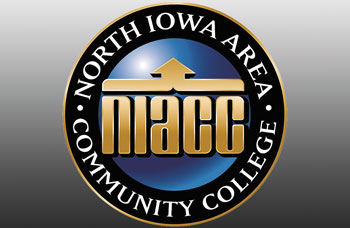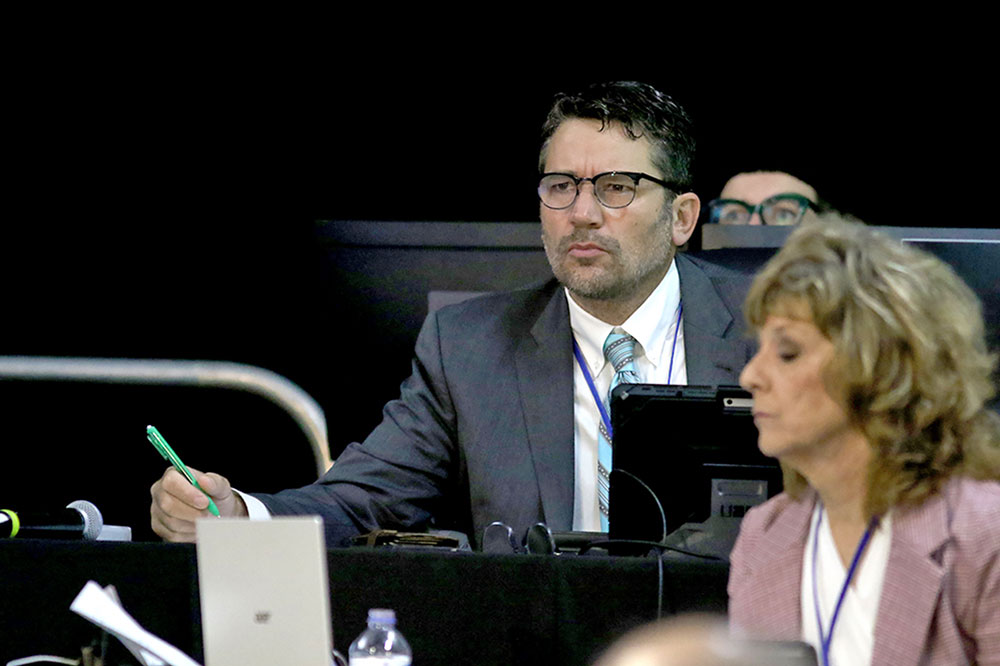Anti-CO2 pipeline coalition hosts speaker event at Floyd County fairgrounds

By Travis Fischer, tkfischer@charlescitypress.com
Landowners, county officials, and more from across Iowa gathered at the Floyd County Fairground on Monday, July 31, for a marathon rally of speakers working against CO2 pipeline plans.
The recently formed “Free Soil Coalition” invited a line-up of speakers to the event, each with their own area of expertise and experience in opposing CO2 pipelines proposed by companies like Summit Carbon Solutions and Navigator CO2 Ventures.
Kicking off the line-up of speakers was Dan Harvey, a firefighter from Gruver in Emmet County, who spoke about the potential hazards that a break in a highly pressurized CO2 pipeline could pose for both people that live in the immediate area and the first responders that would be tasked with trying to save them.
“Who is going to save me when I’m walking 1,100 feet to a house when there’s no engine that can get there?” said Harvey. “We don’t have an unlimited supply of air.”
By Harvey’s estimates, a rupture in a CO2 pipeline would be potentially lethal in a 1,200-foot radius and pose health risks for a much larger area of effect, including reaching into the southern and eastern portions of Charles City depending on the location of the break.
Acknowledging that his numbers were a “best guess,” Harvey criticized Summit Carbon Solutions for withholding its own plume studies and spoke about his concerns about the level of training and equipment Summit is providing first responders.
Spokespersons from both Summit and Navigator have said at other meetings that safety will be a priority and that their pipelines will be constructed at standards higher than the federal requirements. They have also said they will work with local emergency responders to provide training and equipment where needed to deal with potential leaks or ruptures.
The next speaker of the evening was Jared Bossly, a South Dakota farmer who has become the local face of resistance to Summit’s pipeline plans in that state. Bossly spoke about his dealings with Summit, which escalated to the courtroom after conflicting accounts between Bossly and Summit surveyors resulted in an attempt to hold Bossly in contempt.
Bossly said he has since felt targeted by Summit and that the company is using its legal and political resources to damage his land and his reputation without accountability.
“We have to band together and we have to stop something,” said Bossly. “There’s nothing fair about this. Nobody will enforce laws against Summit.”
On the economic side of the pipeline issue, Doyle Turner of Moville was there to speak against the idea of shipping CO2 out of the state. Setting aside the matter of safety or the use of eminent domain, Turner argued that transporting CO2 out of state to be sequestered underground in South Dakota would be a waste of a potentially valuable resource.
“There’s no reason the CO2 should leave our state without adding value to it,” said Turner.
Turner spoke about the increasing demand for methanol fuel, of which CO2 is a key component, in global shipping. Rather than piping CO2 out of the state, Turner said there is a market to build methanol fuel plants adjacent to existing ethanol plants to convert the ethanol byproduct into a valuable commodity.
“There’s no reason to transport CO2,” said Turner. “We have an opportunity to build a more vibrant economy.”
The headline speaker of the evening was former U.S. Rep. Steve King, who explained how increasing value of carbon tax credits created a lucrative incentive for the investors behind pipeline projects like Summit. With billions of dollars at stake, the investors behind the pipeline companies are highly motivated to utilize every avenue possible to advance their plans.
“We’re up against people that will stop at nothing,” said King, who represented U.S. District 4 for Iowa in Congress. “There is no amount of cost we can impose on them that’s going to get them to stop.”
The opposing coalition is likewise working to cover multiple fronts, bringing together unlikely allies across political ideologies. Free Soil Coalition co-executive director Trent Loos, who moderated the event, spoke about the importance of setting aside political differences for the sake of achieving a common goal.
Additional speakers included attorney Anna Ryon, an energy advocate who once ran for Iowa’s third district congressional seat as a Democrat, and is now representing King in legal challenges against the pipeline. Meanwhile, James Judge, who ran for Congress as a Republican, came all the way from Florida to advise the coalition on taking its case to the court of public opinion.
“It’s not unusual for people of a liberal bent or a conservative bent to come together on this,” said Loos.








Social Share